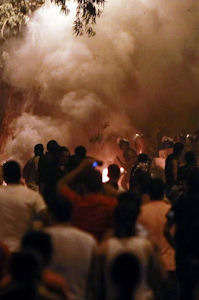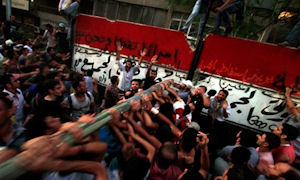WJC ANALYSIS - Dan Diker: Challenges to Israel, threats to Egypt
12 Sep 2011 The dramatic images of Egyptian student demonstrators climbing up to the 17th floor of a Cairo high-rise building to assault and possibly lynch the six remaining Israelis holed up in the Jewish state's Embassy conjured up the stark images of the Iranian revolution of 1979. Burning Israeli flags, the mass demonstration in downtown Cairo and the near takeover of the Israeli diplomatic mission there appeared to mark the end of the 32-year-old (and strategically vital) Egyptian-Israeli peace treaty.
The dramatic images of Egyptian student demonstrators climbing up to the 17th floor of a Cairo high-rise building to assault and possibly lynch the six remaining Israelis holed up in the Jewish state's Embassy conjured up the stark images of the Iranian revolution of 1979. Burning Israeli flags, the mass demonstration in downtown Cairo and the near takeover of the Israeli diplomatic mission there appeared to mark the end of the 32-year-old (and strategically vital) Egyptian-Israeli peace treaty.
However, behind the frightening images broadcast by 'al-Jazeera' to the entire Arab world that were called "incitement to murder" by some Isreali officials, the situation is more complex than meets the eye. First, the violence against Israel was not a Jihad, and the Muslim Brotherhood was not the organization driving the events. Saturday’s incident was marked by the anger of young nationalists, or, as some call them, Nasserists, following the killing of several Egyptian security personnel in the wake of recent terror attack against Israel from the Sinai.
The growing violence unfolding on the streets of Cairo threatens Egypt’s future even more than it does Israel's, perhaps even aligning the two countries' interests almost as much as they were before the street uprising and toppling of the Mubarak government.
 The demonstration was not aimed at Israeli per se. Angry street mobs had protested outside the Egyptian Interior Ministry previously. The Egyptian Spring’s promises of quick elections, new-found employment, better economics and a new life were not quick in coming, and Egyptians were losing their patience. The bubbling public discontent and the ensuing attack on Israel’s Embassy placed the Egyptian army in a difficult position. General Tantawi and the Egyptian supreme military command wanted to avoid copying the vicious actions taken by Syria’s security forces against civilian demonstrators in Hama which resulted in thousands of Syrians killed.
The demonstration was not aimed at Israeli per se. Angry street mobs had protested outside the Egyptian Interior Ministry previously. The Egyptian Spring’s promises of quick elections, new-found employment, better economics and a new life were not quick in coming, and Egyptians were losing their patience. The bubbling public discontent and the ensuing attack on Israel’s Embassy placed the Egyptian army in a difficult position. General Tantawi and the Egyptian supreme military command wanted to avoid copying the vicious actions taken by Syria’s security forces against civilian demonstrators in Hama which resulted in thousands of Syrians killed.
It was also clear that the Egyptian army was losing control. They tried unsuccessfully to disperse demonstrators but did not open fire. It also went unreported that the Egyptian mob also assaulted the Saudi Embassy in Cairo, following reports that Saudi authorities in Mecca and Medina had mistreated Egyptians who made the pilgrimage to Islam’s holiest sites.
The Egyptian army and what remains of the government face anything but a smooth transition and they are already taking steps to stabilize the unraveling security situation. On Sunday, Egyptian security forces stormed the offices of 'al-Jazeera' in Cairo – a far-reaching act for Egyptian authorities to take.
Israel will in all likelihood reinstate its diplomatic staff in Cairo even if that requires far stricter security measures. Egypt needs the nearly two billion dollars per year it receives from the United States, which President Obama, in a thinly veiled threat against Cairo, used as a stick to get the Egyptian commandos to free the trapped Israelis. The Egyptians will want to maintain their relations with Israel intact as US assistance will be important as it remains important to the Saudis with whom the Egyptians want to keep pace in terms of relations with Washington.
Perhaps most important for the Egyptian army and whatever government is to win the next elections is stabiliyt. With the Muslim Brotherhood crouching in Cairo and other cities and waiting for the right moment to assert greater control and challenge the army and competing centers of power, and with the threat to government control from Hamas in Gaza and al-Qaeda elements in Sinai, maintaining a stable relationship with Washington’s greatest ally in the region will be respected.